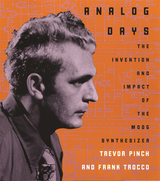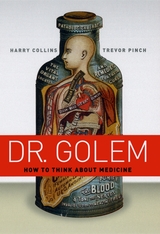
Though ubiquitous today, available as a single microchip and found in any electronic device requiring sound, the synthesizer when it first appeared was truly revolutionary. Something radically new--an extraordinary rarity in musical culture--it was an instrument that used a genuinely new source of sound: electronics. How this came to be--how an engineering student at Cornell and an avant-garde musician working out of a storefront in California set this revolution in motion--is the story told for the first time in Analog Days, a book that explores the invention of the synthesizer and its impact on popular culture.
The authors take us back to the heady days of the 1960s and early 1970s, when the technology was analog, the synthesizer was an experimental instrument, and synthesizer concerts could and did turn into happenings. Interviews with the pioneers who determined what the synthesizer would be and how it would be used--from inventors Robert Moog and Don Buchla to musicians like Brian Eno, Pete Townshend, and Keith Emerson--recapture their visions of the future of electronic music and a new world of sound.
Tracing the development of the Moog synthesizer from its initial conception to its ascension to stardom in Switched-On Bach, from its contribution to the San Francisco psychedelic sound, to its wholesale adoption by the worlds of film and advertising, Analog Days conveys the excitement, uncertainties, and unexpected consequences of a new technology that would provide the soundtrack for a critical chapter of our cultural history.

Dr. Golem explores some of the mysteries and complexities of medicine while untangling the inherent conundrums of scientific research and highlighting its vagaries. Driven by the question of what to do in the face of the fallibility of medicine, Dr. Golem encourages a more inquisitive attitude toward the explanations and accounts offered by medical science. In eight chapters devoted to case studies of modern medicine, Collins and Pinch consider the prevalence of tonsillectomies, the placebo effect and randomized control trials, bogus doctors, CPR, the efficacy of Vitamin C in fighting cancer, chronic fatigue syndrome, AIDS cures, and vaccination. They also examine the tension between the conflicting faces of medicine: medicine as science versus medicine as a source of succor; the interests of an individual versus the interests of a group; and the benefits in the short term versus success rates in the long term. Throughout, Collins and Pinch remind readers that medical science is an economic as well as a social consideration, encapsulated for the authors in the timeless struggle to balance the good health of the many—with vaccinations, for instance—with the good health of a few—those who have adverse reactions to the vaccine.
In an age when the deaths of research subjects, the early termination of clinical trials, and the research guidelines for stem cells are front-page news, Dr. Golem is a timely analysis of the limitations of medicine that never loses sight of its strengths.
READERS
Browse our collection.
PUBLISHERS
See BiblioVault's publisher services.
STUDENT SERVICES
Files for college accessibility offices.
UChicago Accessibility Resources
home | accessibility | search | about | contact us
BiblioVault ® 2001 - 2024
The University of Chicago Press









